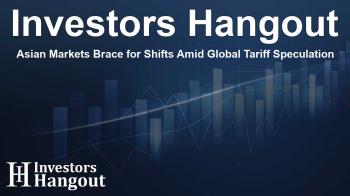Asian Markets Brace for Shifts Amid Global Tariff Speculation

Asian Markets on the Brink of Change
The Asian market landscape is charged with anticipation as traders respond to evolving geopolitical narratives. After a report surfaced suggesting that the incoming U.S. President's tariff policies might not be as severe as previously anticipated, a heightened sense of optimism swept through the financial community.
While the President-elect pushed back against the claims made in a prominent news outlet, investor sentiment appears largely forgiving, leading to a rally in European equities alongside gains in U.S. stock markets. This optimism is reflected in the performance of various currencies as the dollar weakened against both developed and emerging counterparts.
If the promised tariffs end up being limited to only vital sectors and not as expansive as predicted during the campaign, this could foster an environment conducive for robust global growth, consequently triggering a depreciation of the dollar. Such developments would typically signal a favorable scenario for both Asian and emerging economies.
U.S. Market Influences
Nonetheless, the potential for a swift turn of events cannot be ignored. The latest assurances from President Trump, alongside his social media updates, might reignite apprehension among riskier assets, including those in the Asian markets. Following a somewhat buoyant session, Wall Street experienced a slight retreat as traders digested the implications of a persistent rise in Treasury yields.
The 30-year yield has reached its highest point in over a year, approaching the 5.00% threshold. This trend raises flags for cautious investors, indicating that market conditions could become less favorable if volatility remains.
Political Climate and Economic Data
Adding an extra layer of complexity is the backdrop of political uncertainty. Events in South Korea prompt concern, while the political landscape in Canada seems to shift following the announcement of Prime Minister Trudeau’s resignation. Such political changes can also weigh heavily on market sentiment, prompting investors to seek safety in conservative assets.
Japanese financial markets are also noteworthy, as they navigate through yield spikes. The Bank of Japan's Governor has signaled further interest rate hikes, contributing to the rise in Japanese Government Bond (JGB) yields, which have reached levels not seen in years. The 10-year JGB yield recently peaked at 1.1350%, signaling potential shifts in borrowing costs and investor strategies.
Japanese Market Trends
As traders look towards the Japanese stock market, the dynamics seem precarious. The Nikkei 225 index experienced a significant drop, down 1.5%, marking its steepest decline in months. This downturn raises questions about how Japanese equities will respond amidst fluctuating yields and a weaker yen.
Will domestic stocks react favorably to export advantages brought about by currency challenges, or will they be hampered by increasing borrowing costs? Such uncertainties will guide investor strategies on Tuesday as they remain on watch for economic indicators.
China's Economic Landscape
China's financial observers will closely monitor the two-year bond yield, which is dangerously close to the 1% mark. The Chinese yuan's depreciation against the dollar further complicates matters as market volatility casts a shadow on the domestic currency, which recently crossed the 7.33 per dollar threshold, inching towards a potentially historic low.
The economic calendar for the region looks sparse, with attention focused on expected inflation releases from the Philippines and Taiwan, along with the latest data on China’s foreign exchange reserves. These reports could provide crucial context for market participants navigating the uncertain economic waters.
Key Upcoming Developments
As the Asian markets gear up for the day ahead, several key developments could offer insight into market movements:
- Japan's 10-year bond auction
- China's latest foreign exchange reserves
- Inflation report from Taiwan
Frequently Asked Questions
What are the key factors influencing Asian markets right now?
Investor sentiment following U.S. tariff speculation and Japanese bond yield increases are major influences.
How are U.S. tariffs expected to impact global growth?
Limited tariffs on critical sectors could enhance global economic prospects and weaken the dollar.
What is the current state of Japan's bond yields?
Japan's bond yields are currently at multi-year highs due to signals of interest rate hikes from the Bank of Japan.
How is the political landscape affecting markets?
Political uncertainties in South Korea and Canada could lead to increased market volatility affecting investor confidence.
What economic indicators should we watch in Asia?
Key upcoming indicators include Japan's bond auction results and inflation data from the Philippines and Taiwan.
About Investors Hangout
Investors Hangout is a leading online stock forum for financial discussion and learning, offering a wide range of free tools and resources. It draws in traders of all levels, who exchange market knowledge, investigate trading tactics, and keep an eye on industry developments in real time. Featuring financial articles, stock message boards, quotes, charts, company profiles, and live news updates. Through cooperative learning and a wealth of informational resources, it helps users from novices creating their first portfolios to experts honing their techniques. Join Investors Hangout today: https://investorshangout.com/
Disclaimer: The content of this article is solely for general informational purposes only; it does not represent legal, financial, or investment advice. Investors Hangout does not offer financial advice; the author is not a licensed financial advisor. Consult a qualified advisor before making any financial or investment decisions based on this article. The author's interpretation of publicly available data shapes the opinions presented here; as a result, they should not be taken as advice to purchase, sell, or hold any securities mentioned or any other investments. The author does not guarantee the accuracy, completeness, or timeliness of any material, providing it "as is." Information and market conditions may change; past performance is not indicative of future outcomes. If any of the material offered here is inaccurate, please contact us for corrections.
